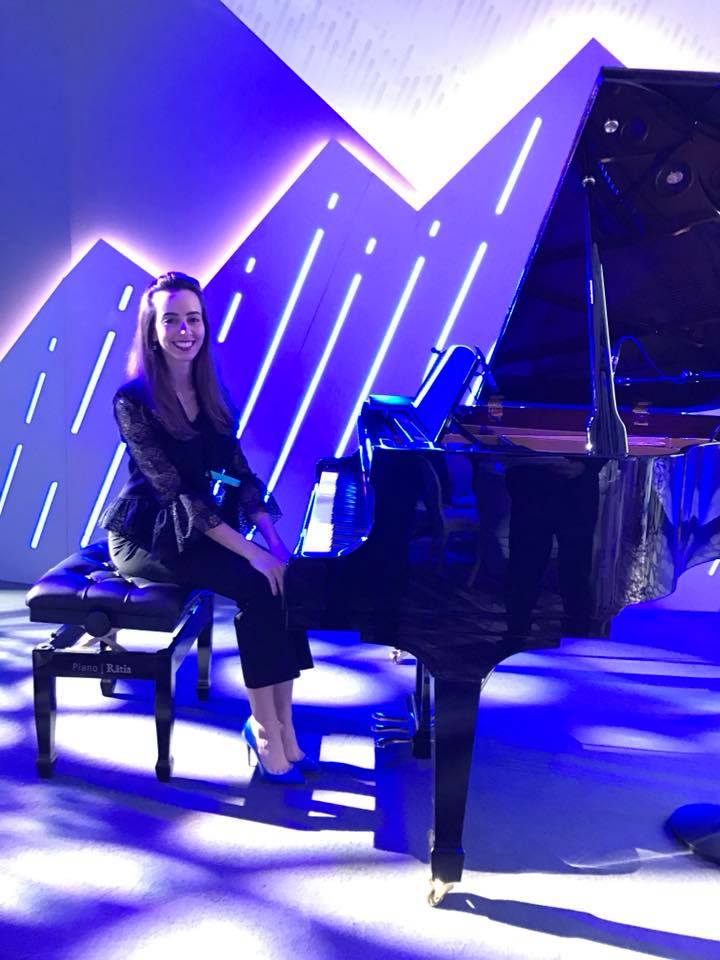Nadia Dandachi is a general physician and a pianist from Saudi Arabia, who first started playing the piano at the age of six and never stopped doing it since. When she was 14 years old, Nadia Dandachi became the first Saudi musician to win international music awards in a piano competition and later became known as Saudi Arabia’s first professional pianist. She has performed in several international events and was invited to speak at the United Nations about her experience in learning music in the Kingdom, at a time when no music schools or teaching possibilities existed, and the growth and development that has happened in her country since. She was born in Jeddah and lived there her whole life, until she moved to Germany three years ago to pursue her medical specialization in pediatrics. Nonetheless, she never let her medical career come in the way of her other passion, music.

Where does your passion for music come from?
“Both my parents have always loved and appreciated music and art, and since I was young, I was deeply connected with music. When I was 3 years old, I loved to play with a little toy piano that I had at home and I learned how to play a melody that my nanny used to often sing. So when my parents noticed that I had a talent for music, they were very excited to give me piano lessons when I grew a little older, and I’m really lucky to have had the opportunity to express myself through music since.”
Why was it hard to learn music in Saudi Arabia?
“I grew up in the early nineties, and back then music was not as widely accepted or allowed to be played in public spaces, such as cafés or restaurants. There were no music schools or music subjects being taught, no public musical events or concerts allowed, and music education and awareness remained lacking. Despite that, I took my musical education seriously and with a lot of passion. I took private lessons at home and was classically trained for a few years, but sadly, I had to stop the lessons eventually, since there was no one available that was capable to teach me more after I had reached a certain level. I still continued to put in daily hours of practice to reach the level that I have on my own, by challenging myself and improving my skills through learning more difficult pieces and staying dedicated. The lack of music awareness is changing completely in the Kingdom though, and people are much more interested in learning how to play an instrument now and some schools are starting to open up. Artists and musicians are also receiving a lot of encouragement and support from the Kingdom and the first national orchestra has even been formed.”

Did you find it hard to accept the fact that you couldn’t play music in public?
“Of course while growing up I was sad about it, because I wanted to be able to share my music with others, and as a musician, you do want people to hear and see you perform. However, that’s why I started my YouTube channel in 2010, to show that Saudi Arabia too has musicians that can share beautiful music with the world. I had a rapidly growing audience following me online and people were very excited and surprised that there was a Saudi woman doing this. Many of my followers still continue to ask me how they can best learn how to play the piano all the time, and many have bought instruments and sought lessons because of my videos. I regularly create content and publish free music lessons in the Arabic language, to encourage music education in the Kingdom and to help people live that same passion as well.”
Have you ever received criticism for playing music?
“If I’m completely honest, the criticism I had received when I first started publishing my music videos on Youtube was more directed towards the fact that I was not a veiled woman, than the fact that I played music. Everyone on the internet can express their opinions these days, so I never let that affect me, and most of my followers actually appreciated my musical performances and were very supportive and encouraging. I was bullied in medical school because many students told me that I wouldn’t succeed in my medical career while being distracted by music, but I was able to prove them wrong and excel in both my studies and hobbies. Music arguably makes me a better doctor, because it keeps me in touch with my senses and helps me maintain a healthy balance in life. I can speak four languages fluently and I worked on several research and volunteer projects during medical school, so I’ve always been really good at organizing my time. I believe that’s the key to being able to do so many different things in life.”
Was the support from your family important? And tell us more about your experience in winning musical awards.
“Absolutely, my parents played a huge role in giving me the opportunity to learn music. It was also my parents’ idea to enroll me in the piano competition where I won First Prize in my age category and an ISESCO prize in 2006, the first time that any Saudi national won an award in an international music competition. In preparation for it, I practiced daily for a whole year, and in the last three months before competition day, I practiced on my piano for at least nine hours a day every day, aged only 14 years old. I think one has to be very passionate and disciplined to be able to put this much hard work into something and to beat the odds.”
Why did you decide to study medicine and not music at university?
“I definitely considered studying music at university, but I think that it is always important to have a passion in life outside of work. Medicine was the perfect choice for me since I always loved science, reading and helping people. I’m currently specializing in pediatrics in Germany and I’m in love with what I do. I also regularly publish medical videos online in the Arabic language to spread more awareness about health topics in the Kingdom.”
What do you love about music?
“I’ve always been better at expressing myself through music than words, and composing my own musical pieces to tell my story has often been quite therapeutic for me. Music makes me feel happy and relaxed, and letting out some energy by playing the piano after I’ve had a long day at work has often helped me deal with stress. Playing music is very healthy and beneficial, especially for young people, as it encourages neuronal development in the brain and has been proven to help kids do much better in many subjects in school, like math and learning languages. Music also teaches discipline and dedication, helps one learn how to balance or manage emotions, and is especially beneficial for people who struggle with anxiety or depression. It’s simply beautiful, and life would be so boring without it.”
What would you like to say to people who are not finding the right support to achieve their dreams?
“Don’t wait for someone else’s support or acceptance to do what you’re truly passionate about, because everyone has the power to shine in their own way and to push boundaries if they believe that they can. It can be difficult at times to find enough enthusiasm or to stay motivated, but that’s why disciplining yourself and pushing yourself to do the hard work, even when you don’t necessarily feel like it, always pays off sooner or later. Nothing beautiful in life comes easy, so keep that in mind and always remember to enjoy the journey and not just reaching the specific goal!”











